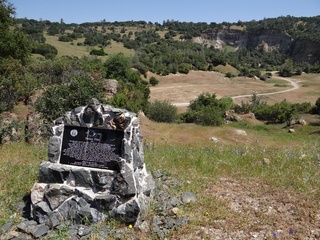Sucker Flat is a Gold Rush-era community that is located on the south bank of the Yuba River, north of Smartsville.
The U.S. Postal Service sometimes lists addresses in Sucker Flat as being in Smartsville, because they are both in the 95977 zip code. However, on the Yuba-Sutter Wiki, we prefer listing the more specific location Sucker Flat.
History
 This plaque dedicated by E Clampus Vitus reads, "This now quiet valley was once the site of the Gold-Rush era town of Sucker Flat - and of the Blue Point and Blue Gravel Mines. These were two of the richest hydraulic mines in California, which along with a number of other claims worked the gold-bearing placers laid under these hills by the Pliocene Yuba River. The water for the hydraulicking came over 20 miles from Nevada City in the Excelsior Ditch, and Grass Valley in the Tarr Ditch. The slurry was carried out to the present-day Yuba River in long sluice tunnels carved at great expense through hard basaltic rock. By 1877 a reported $13 million in gold had been mined, but the vast amounts of rock and gravel washed into the river caused tremendous destruction downstream. In 1884 the Sawyer decision, supported by the valley's farmers, stopped the thriving industry in its tracks." In the background you can see cliffs carved by hydraulic mining. Photo by queerbychoice. The History of Yuba County, California (Chapter XXVII: Rose Bar Township) by Thompson & West, 1879, described Sucker Flat this way:
This plaque dedicated by E Clampus Vitus reads, "This now quiet valley was once the site of the Gold-Rush era town of Sucker Flat - and of the Blue Point and Blue Gravel Mines. These were two of the richest hydraulic mines in California, which along with a number of other claims worked the gold-bearing placers laid under these hills by the Pliocene Yuba River. The water for the hydraulicking came over 20 miles from Nevada City in the Excelsior Ditch, and Grass Valley in the Tarr Ditch. The slurry was carried out to the present-day Yuba River in long sluice tunnels carved at great expense through hard basaltic rock. By 1877 a reported $13 million in gold had been mined, but the vast amounts of rock and gravel washed into the river caused tremendous destruction downstream. In 1884 the Sawyer decision, supported by the valley's farmers, stopped the thriving industry in its tracks." In the background you can see cliffs carved by hydraulic mining. Photo by queerbychoice. The History of Yuba County, California (Chapter XXVII: Rose Bar Township) by Thompson & West, 1879, described Sucker Flat this way:
| When the high water came during the winter of 1849, the miners moved back [from the river] into the ravines, where they found very rich surface diggings. Squaw creek was a very rich locality. One of these ravines was worked by a man named Gates, and a town collecting there in 1850, it was called Gatesville, or Sucker Flat. The latter name was given it because Gates was a native of Illinois [which is nicknamed the "Sucker State"]. A store was started here that winter by a man named McCall. Rose Bar was on the river and Sucker Flat just back of it, the two places being practically one. In 1851, the joint population was three hundred men and five women. The nearest post-office was at Parks Bar, a few miles below and on the opposite side of the Yuba river. Rose & Reynolds closed out their business in 1850. L. B. Clark had a store at Rose Bar also. When the bar began to be worked out and the hydraulic mines were developed, Sucker Flat became quite a town, and Rose Bar was abandoned. Daniel Donohue purchased McCall's old store in 1853, and a few other stores were started. In 1858, a fire destroyed Donohue's store, several other small stores, and a great many dwellings. Rose Bar is now covered up with tailings from the mines, and Sucker Flat is simply a place of residence for the men who work in the hydraulic mines. There are now three small saloons, two boarding houses, and from fifty to sixty miners' cottages. The population is about three hundred. Smartsville is now the base of supplies for the people of Sucker Flat. |
Events
April: Smartsville-Timbuctoo Pioneer Day


